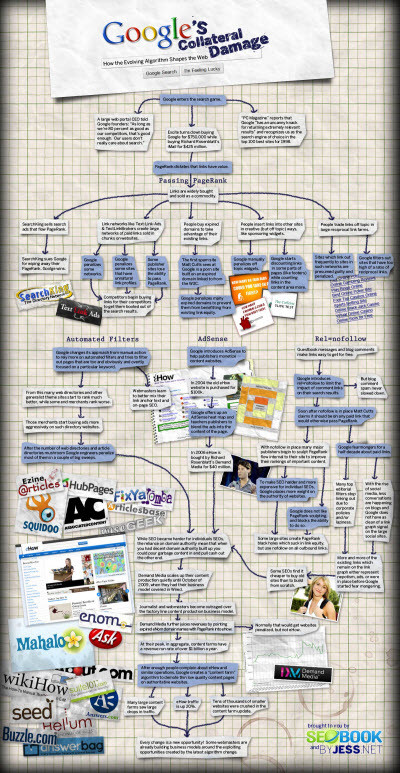How Google’s Panda Will Change the Web
As Aaron Wall from SEO Book demonstrated, Google’s algorithm changes change the course of the Web. Aaron took the negative approach by focusing on Collateral Damage, but there are certainly upsides as well as site owners develop their sites to succeed within the Google ecosystem.
Panda is likely to cause the following shifts in how the web evolves:
- More focus on user experience, including fewer ads hiding the content.
- Less use of non-unique content. This includes fewer
- scraper sites
- nearly identical sites that take standard product feeds
- mashups, where sites create a unique experience by combining non-unique elements on a page.
- More community-generated content.
All told, Panda should make the Google ecosystem a better place. As Rich Skrenta pointed out years ago, Google is “the start page for the internet” and “companies will succeed by working within the framework of Google’s industry dominance.” Google’s choices regarding which behaviors to incentivize drive the web’s development.
Speaking from the perspective of product management of a large web site, I’m mostly happy with Panda. It better aligns our short & long term interests. Now on trade-offs between user experience and other business metrics we can factor likely Google traffic changes into our analyses. This better aligns our interests with our users’, and will help us make choices that improve quality of user experience. Ultimately this helps web publishers and users.
My biggest problem with Panda is that the feedback loop is even less direct and immediate than it was before. It’s like a pitcher throwing 100 pitches a game for a month and only afterwards getting some hints as to approximately how many of those pitches were strikes and whether or not he pitched well enough to win most of those games. Google may counter that a pitcher shouldn’t nibble at the corners, he should just throw the ball down the middle, but that’s not a viable path to success in a competitive environment. In our case, throwing the ball down the middle would be removing all ads and NoIndexing any of our pages on which any of the data sources that we license has been subsequently licensed by another site. It’s ironic that Google, which is so associated with fast iterations based on metrics-driven decisions, has created an environment where websites are flying so blind.
The other downside is that, as Aaron Wall pointed out, we’re in a never ending cat and mouse game. Google just incentivized a whole new set of behaviors. Matt Cutts had always said that Google wouldn’t use signals like clicks on search results because they were too spammable. Now they’ve reversed course. Todd Friesen (back when he considered himself a black hat SEO) once said that he loved real time search because it was so spammable. Well, those spammable factors are getting more significant. And the more Google uses social media signals, the more time spammers will spend manipulating those signals. Google’s use of social media signals may be good for Google, but it’s bad for social media.
The most discussed irony of the Panda update is that people thought it was to fight “content farms like eHow” and yet eHow emerged as one of the big winners. Panda rewards sites with unique content that are not over-monetized and that users find valuable, whether or not bloggers and competitors hate them, and whether or not they target searches that we find puzzling. So this was good for eHow. And IMO Panda’s use of user signals will have a positive influence on eHow, forcing them to provide sufficient quality to satisfy their users.
So Panda is a nice step forward for the web. It incentivizes sites to do the right things. It will force sites to focus more user experience. Its incentives for community generated content will also push the web in the direction of greater user participation. Ads won’t hide the content you’re looking for. Sites that don’t have comments sections or forums will consider adding them.
Many sites will respond to Panda by becoming better sites. Others will respond by manipulating these algorithmic shifts in ways that hurt the web. And around we’ll go until the next Google update.

April 16, 2011 @ 11:26 pm
I mostly (say 99%) agree with your analysis, but I think that the number of scrapers & content recyclers will actually go up. If you know site x has a bad karma penalty against it then you would likely be able to outrank it based on simply posting the same content to any site which is indexed and does not yet have a bad karma penalty against it.
April 17, 2011 @ 4:21 am
That’s depressing. But makes sense.
Google Data & Algorithm Updates and Panda
June 21, 2011 @ 3:25 pm
[…] I’ve written, Panda should mostly make the Web better, though I’ll be happier when there’s a better feedback loop helping sites succeed in […]
Google Panda, eHow, and the South Indian Monkey Trap
June 24, 2011 @ 5:26 am
[…] Yes, Google Panda should make the Web better. Panda penalizes sites for having too many low quality pages, which will stop sites from throwing up millions of crap pages in the hope that a small percentage will rank. It’s like gmail’s spam filter blocking a good e-mail because too many other of that sender’s e-mail were deemed spam. […]
January 10, 2012 @ 11:49 pm
My opinion, we still need BL to boost serp.
Answers and About.com
August 8, 2012 @ 11:35 am
[…] Panda update didn’t help. Too many sites had adopted About’s basic model but were putting out […]
Answers and About.com | hertfordshire seo
October 24, 2013 @ 12:29 pm
[…] Panda update didn’t help. Too many sites had adopted About’s basic model but were putting out […]